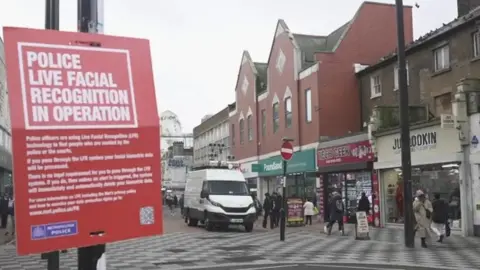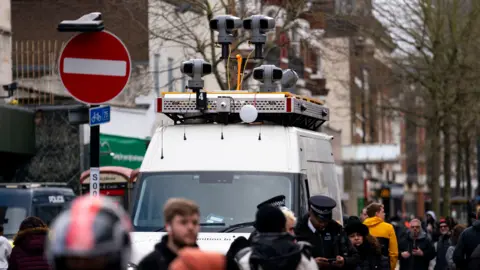Street furniture to be used for facial recognition
 BBC
BBCFacial recognition cameras are to be mounted on street furniture in a pilot in Croydon, south London, the Metropolitan Police has said.
It follows previous deployments of vans with live facial recognition (LFR) in a number of London boroughs, including Croydon, by the Met.
LFR works by mapping a person's unique facial features, which can be matched against faces on watch-lists.
However, some are concerned about how data will be used and stored, while Green Party London Assembly member Zoe Garbett described the scheme as "subjecting us to surveillance without our knowledge".
Under the new pilot, while the cameras will be permanent fixtures on furniture, they will only be switched on when officers are using the technology in the area.
The Met said its safeguarding procedures mean any biometric data from members of the public who are not wanted by the police is immediately and permanently deleted.
There are no plans to expand the scheme to any other sites in London, the force added.
The force previously said using LFR "is a direct result of listening to community concerns about serious violence and other issues like theft and criminal damage in the Croydon area".
 PA Media
PA MediaA force spokesperson said: "The Met is committed to making London safer, using data and technology to identify offenders that pose a risk to our communities.
"Last year we made over 500 arrests using LFR - removing dangerous individuals who were suspected of serious offences, including strangulation, stalking, domestic abuse and rape.
"We continue to engage with our communities to build understanding about how this technology works, providing reassurances that there are rigorous checks and balances in place to protect people's rights and privacy."
LFR technology itself is not new and has been used repeatedly in a number of boroughs in London, including during the King's Coronation in 2023.
It has also been used on more than 30 occasions in Croydon since the start of 2024, according to data gathered by Green Party London Assembly member Zoe Garbett, who is campaigning against the pilot.
She said of the wider use of LFR: "Facial recognition subjects everyone to constant surveillance, which goes against the democratic principle that you shouldn't be monitored unless there's a suspicion of wrongdoing.
"The Met claims live facial recognition has been a success in London, but how is treating millions of Londoners as suspects to be considered as a success?
"The arrest figures are low, and it's really just subjecting us to surveillance without our knowledge."
Listen to the best of BBC Radio London on Sounds and follow BBC London on Facebook, X and Instagram. Send your story ideas to [email protected]
